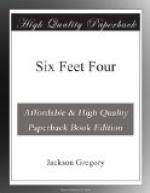Here were a few straggling houses with many vacant lots between and no single light to show that any were awake, no gleam from a window to cut through the darkness which was absolute. Thornton drew his horse to the side of the road where the grass had not been worn away by the wheels of wagons and where the animal’s footfalls were muffled, hardly to be heard a score of paces away. Twice he stopped, frowning into the gloom about him, seeking to force his eyes to penetrate the impenetrable wall of the dark, straining his ears to catch some little sound through the silence. But there was nothing to see save the black forms of houses and the pear trees in Pollard’s yard, shapeless, sinister shadows something darker than the emptiness against which they stood; no sound save his horse’s breathing, the faint creak of his own saddle leather, the low jingle of bridle and spur chain.
“Almost too still to be true,” he told himself. “But,” with a grim tightening of his lips, “too infernally dark for a man to pick me off with a shotgun if he wanted to!”
Fifty yards from Pollard’s front gate he stopped his horse, swung down noiselessly from the saddle and tied Comet to a tree standing at the edge of the road; his jingling spurs he removed to hang them over the horn of his saddle. Then he went forward on foot, walking guardedly, his tread upon the grass making no sound to reach his own ears, and came to Pollard’s gate.
It was so dark under the pear trees that the obscurity was without detail; he must guess rather than know where the tree trunks were; it was hard to judge if they were ten feet or fifty feet from him. There might be no one here to keep tryst with him, while on the other hand a dozen men might be waiting.
For perhaps two or three minutes he waited, standing motionless at the gate. No faint noise came to him, no hint of a shadow stirring among those other shadows as motionless as they were formless. The night seemed not to breathe, no sound even of rustling branches coming to his ears from the old pear trees.
“It’s twelve o’clock, and after,” he thought. “If she’s coming she ought to be here now.”
Still he waited. And then when he knew it must be ten or fifteen minutes after the time Winifred had set, and remembering that she said specifically “under the pear trees,” he moved forward suddenly, jerked the gate open and stood in Pollard’s yard.
The little noise of the gate whining upon its worn hinges sounded unnaturally loud. His footfall upon the warped board walk which led to the front door snapped through the silence like a pistol shot.
“If there’s anybody laying for me here he knows now that I’ve come,” he told himself. And with no hesitation now, yet with no lessening of his watchfulness, he came on swiftly until he stood under the pear trees and within ten feet of the front porch.




